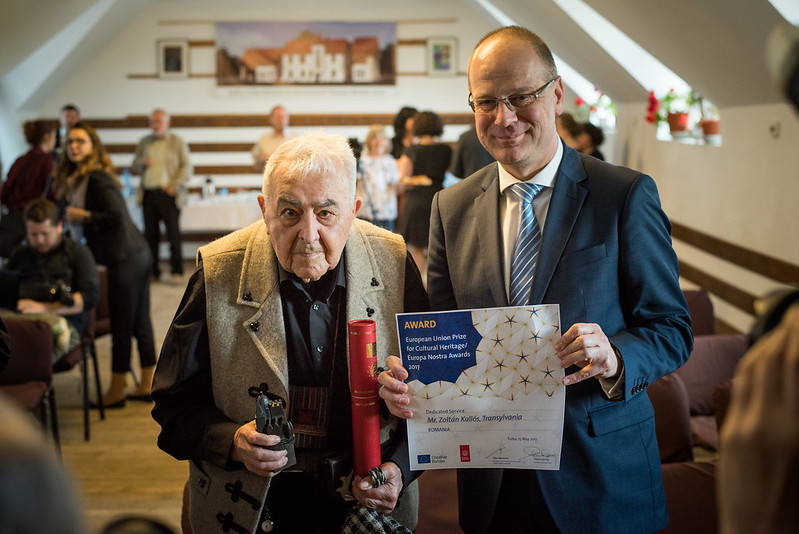Mr. Zoltán Kallós receives Award from Commissioner Navracsics at ceremony in Romania
The renowned Hungarian folklore collector Mr. Zoltán Kallós received the EU Prize for Cultural Heritage / Europa Nostra Award from European Commissioner Tibor Navracsics at a ceremony held on 18 May 2017 in his hometown of Rascruci in Cluj County, Romania. This local award ceremony was of particular importance for Mr. Kallós as he had been unable to attend the European Heritage Awards Ceremony held on 15 May in Turku, Finland. Mr. Zoltán Kallós was one of the big winners of this year, taking home both an Award in the category Dedicated Service as well as the Public Choice Award, chosen by online voters across the world.
Mr. Kallós’ collection encompasses both tangible and intangible elements of the Hungarian, Romanian, Saxon and Roma communities of Transylvania. He has devotedly compiled this collection over the last 70 years, aiming to conserve not just the physical evidence of this rich culture, but also the songs, poems, dances, customs and folklore that form the basis of so much of our European identity.
During the local award ceremony in his hometown of Rascruci, Mr. Kallós stated: “I never worked for the Award or for money. I collected these objects, songs, dances and customs for the future. Without this collection we would be poorer. We would never have heard about these ballads, these songs or of the people that I collected them from. They are very precious. I was doing this for our community and I hope that somebody will continue the work.”
Watch message by Mr Kallós at Ceremony in Turku
Tibor Navracsics, European Commissioner for Education, Culture, Youth and Sport, highlighted how Mr. Kallos’ work has enriched the European community and how his oeuvre is symbolic of European Union’s motto ‘United in diversity.
Maria Berza, who represented Europa Nostra at the ceremony, noted that the Award recognises over seven decades of outstanding work for the preservation and promotion of Europe’s cultural heritage. She also highlighted that without the work of Zoltán Kallós, much of this important cultural heritage would have been lost.
Hunor Kelemen, President of the Democratic Union of Hungarians in Romania, added: “Zoltán Kallós very much deserved this prestigious Award. He is a guardian of our shared heritage. What he has collected and what he has accomplished as an educator and mentor is relevant for all of us, Europeans.”
The local award ceremony was attended by some 50 people and was concluded by a performance by children who study at the Kallós Zoltán Foundation. The participants sung Mr. Kallós’ favourite folk songs in tribute to the folklorist.







